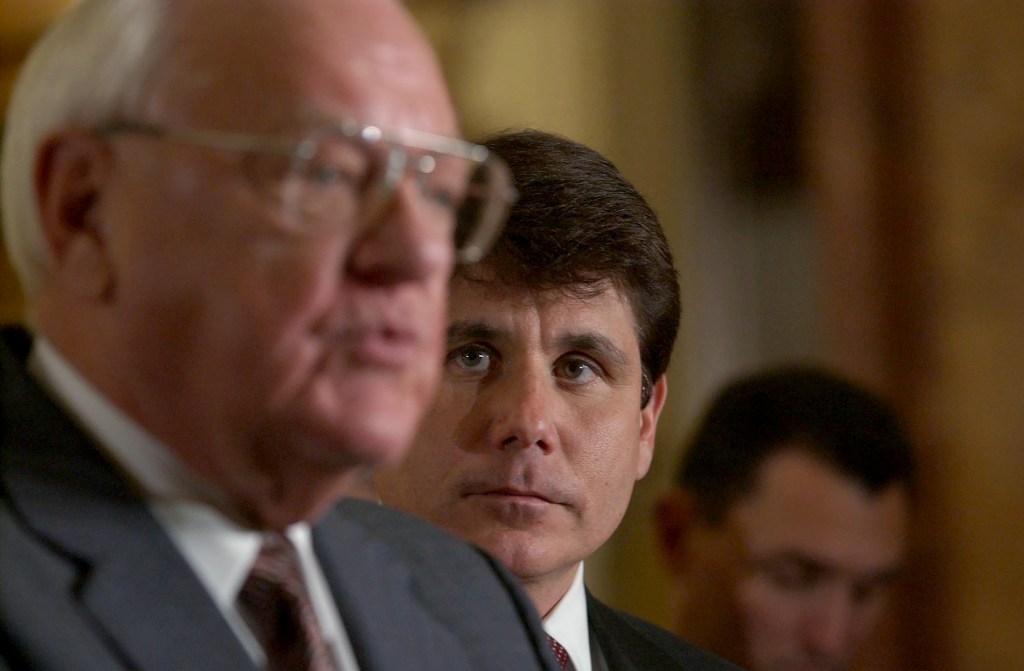Read the series on Illinois’ notorious political legacy
What makes Illinois so corrupt? In the coming weeks and months, the Tribune will explore and attempt to explain why corruption continues to poison virtually every level of government in our state, draining off tax dollars and robbing public service of its meaning.
The reasons are many, the Tribune found, beginning with the ambition and greed brought here by many of Illinois’ first European settlers. But numerous other factors contribute to Illinois’ shameful record: Loosely regulated big-money campaigns. Domineering mayors letting shifty aldermen run amok. Cozy interactions between lobbyists and public officials. A ballot process power brokers often use to exclude newcomers. The largest number of governmental bodies in the nation, offering endless opportunities for graft amid little oversight.
Dishonest politicians at all levels of Illinois government make a mockery of public service
Illinois nurtured the nation’s greatest president in Abraham Lincoln. It is the birthplace of iconic Republican President Ronald Reagan and the state where Democrat Barack Obama, the country’s first Black president, developed his political chops.
But Illinois is far better known for a more notorious political legacy: constant and persistent corruption. Four of its last 11 governors went to prison. Chicago, its largest city, is home to sweeping federal sting operations that put busloads of judges, aldermen, state lawmakers and other officials behind bars.
Even the state auditor — Illinois government’s financial watchdog — was once caught looting and squandering $2.5 million in public funds. One secretary of state famously amassed more than $750,000, including a shoebox stuffed with cash, that was found stashed in a hotel room after his death. Read part one of our series.

Big money floods Illinois campaigns with few rules and little enforcement
At the Democratic National Convention in Chicago, the importance of money in national politics was clear, from the appeals made at fancy fundraisers to the unrelenting streams of video ads and text messages.
But in Illinois, big money is inundating politics at a pace that virtually puts government offices in the Land of Lincoln up for sale.
Few states invite politicians to raise and spend so aggressively as Illinois, where large infusions of cash led by billionaire Democratic Gov. JB Pritzker and his billionaire Republican enemies are enabled by loose rules and feeble enforcement standards that tempt politicians to push the limits of campaign finance boundaries. Read part two of our series.

Code of silence, aldermanic prerogative fuel dozens of corruption convictions
In the half-century since Mayor Richard J. Daley presided over Chicago’s notorious Democratic machine at the height of its power, nearly 40 aldermen from across the city have ended up behind bars.
The roll call of aldermen convicted of corruption includes a father and son charged nearly 30 years apart, the two most powerful aldermen over the last five decades and a self-styled good government champion who was known to some as the “conscience of the council.”
From 1976 through 2021, the Chicago metropolitan area saw more than 1,800 federal corruption convictions, the most in the nation.
But in Chicago, it comes down to two main factors: a deeply ingrained culture where the ruling attitude toward corrupt actions is “you didn’t see nothin’,” and an unwritten power-sharing agreement between the city’s mayor and the council that has neutered the usual checks and balances on government actions at City Hall. Read part three of our series.

In Chicago, corruption is a source of both shame and perverse pride
On many nights during his long career as alderman of the 43rd Ward, Mathias “Paddy” Bauler would hold court in the North Avenue tavern that served as his headquarters from the 1930s into the 1960s. Often with a beer in hand, he would loudly proclaim, “Chicago ain’t ready for reform.”
He might as well have said or added, “Chicago is always ready for corruption.”
This city, and by extension the state, have long been and remain what a University of Chicago political science professor – and many others, from writers to late-night television hosts – have derided as “the only completely corrupt city in America.” As one local, the late Studs Terkel, charmingly put it in 1986: “Chicago is not the most corrupt of cities. The state of New Jersey has a couple. Need we mention Nevada? Chicago, though, is the Big Daddy. Not more corrupt, just more theatrical, more colorful in its shadiness.”
How did we get so “lucky”? Read more.
The Dishonor Roll: Public officials who helped build Illinois’ culture of corruption
The Tribune has compiled a list of roughly 200 convicted, indicted or generally notorious public officials from Illinois’ long and infamous political history.
Meet the small-town official behind the largest municipal fraud in the country’s history, the Chicago mayor with ties to gangster Al Capone and many more. See the full list.
The post Our culture of corruption: Exploring Illinois’ political legacy appeared first on Patabook News .

